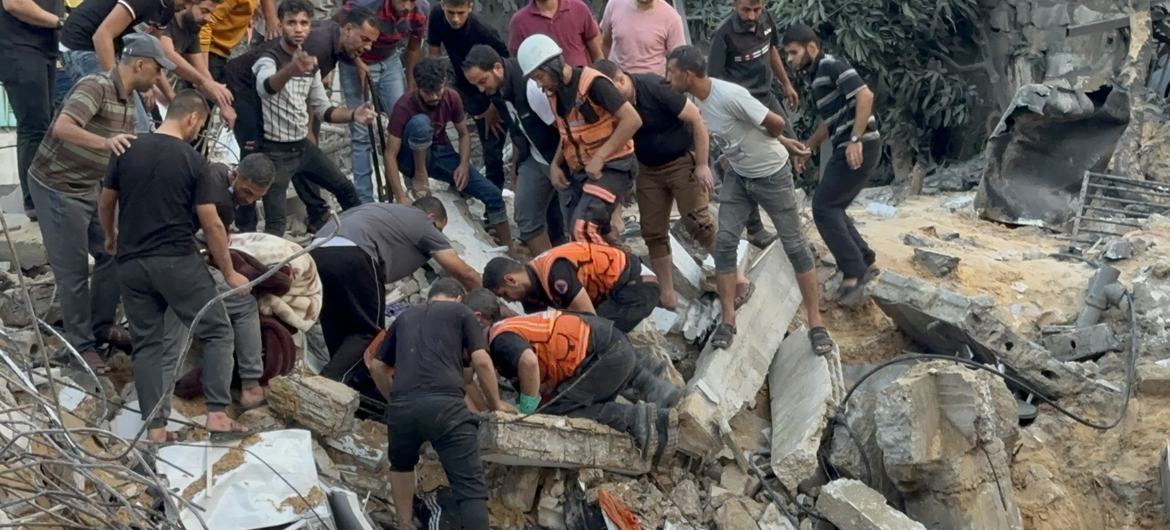At least 45 people, including several women and a week-old infant, were killed in Gaza overnight and into Wednesday, May 21, 2025, due to continued Israeli airstrikes, according to local hospitals.
These new casualties mark yet another grim chapter in Israel’s ongoing war with Hamas.
The conflict that has shown no signs of de-escalation, even as international condemnation of Israel’s expanding offensive continues to grow.
The latest strikes occurred in several areas of Gaza, including the southern city of Khan Younis, where 24 individuals were reported dead.
Among them were 14 members of a single family.
In central Gaza, the death of a week-old infant added to the tragic toll.
The Israeli military has not commented directly on these specific strikes.
However, it has maintained that it is targeting Hamas infrastructure.
Also, it accuses the group of operating within civilian zones, thus endangering local populations.
As the violence persists, so too does the humanitarian crisis.
On Tuesday, Israel began allowing humanitarian aid trucks into Gaza, a long-awaited move given the dire conditions within the enclave.
However, aid groups report that the supplies have yet to reach the Palestinians who need them most.
According to United Nations spokesperson Stéphane Dujarric, although trucks entered Gaza, aid workers were unable to distribute the goods.
He said this was due to logistical obstacles created by the Israeli military, including orders to reload supplies onto different trucks.
The process took too long, and aid workers were left without enough time to deliver the aid to the designated areas.
Internal documents shared among aid agencies and seen by The Associated Press indicated that no humanitarian trucks had exited Kerem Shalom, a key border crossing in southern Gaza.
Although 65 trucks reportedly moved from the Israeli side to the Palestinian side of the crossing, they had not made it into Gaza proper for distribution.
The Israeli defense body overseeing aid to Gaza confirmed that trucks had started entering the territory on Wednesday morning.
It however remained unclear whether the aid was successfully reaching distribution centers.
Meanwhile, the United Nations agency for Palestinian refugees (UNRWA) stated it had waited for hours at the crossing on Tuesday to collect supplies but ultimately failed to retrieve any.
This deepening humanitarian crisis is triggering political consequences.
On Tuesday, the United Kingdom announced the suspension of free trade talks with Israel due to the intensifying military campaign.
This followed a joint declaration by the U.K., Canada, and France earlier in the week that they would take concrete actions to pressure Israel to end the war.
Additionally, European Union foreign policy chief Kaja Kallas said the EU was reviewing its trade agreement with Israel in response to the situation in Gaza.
Israel maintains that it will not halt the war until all hostages taken by Hamas are returned and the militant group is either eliminated, disarmed, or exiled.
On the other hand, Hamas has stated it is prepared to release the hostages only in exchange for a complete Israeli withdrawal from Gaza and an end to the war.
The group rejects demands for disarmament or exile.
In a move signaling a pause in ceasefire negotiations, Israel withdrew its senior delegation from the Qatari capital of Doha on Tuesday.
However, lower-level officials remain engaged in the talks.
These negotiations aim to secure the release of remaining hostages and discuss potential terms for a ceasefire.
The war began after Hamas-led militants launched a deadly attack on southern Israel, killing approximately 1,200 people, mostly civilians, and abducting 251 individuals.
To date, around 58 hostages remain in Hamas custody, with estimates suggesting that only about one-third of them are still alive.
Most of the others were released in earlier ceasefire deals or other agreements.
Israel’s military response has been extensive and devastating.
According to the Health Ministry in Gaza, more than 53,000 Palestinians have been killed in the conflict.
The majority of the dead are women and children, though the ministry does not distinguish between combatants and civilians in its casualty reports.
As the death toll rises and humanitarian efforts falter, international pressure on Israel intensifies, but a resolution to the conflict remains elusive.







